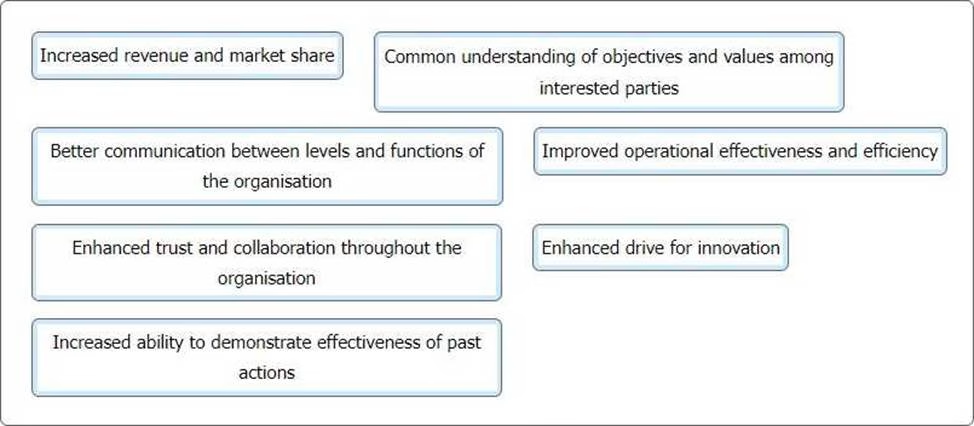Below are four of the seven principles on which ISO 9000 series are based. Match a potential benefit to each of the quality management principles (QMP)
DRAG DROP
Below are four of the seven principles on which ISO 9000 series are based. Match a potential benefit to each of the quality management principles (QMP).


To compete the table click on the blank section you want to complete so itis highlighted in red and then Click on the applicable text form the options below.
Answer: 
Explanation:
Quality management principles:
Customer focus = Increased revenue and market share
Engagement of people = Enhanced trust and collaboration throughout the organisation
Improvement = Enhanced drive for innovation
Evidence-based decision-making = Increased ability to demonstrate effectiveness of past actions
According to the Quality management principles document published by ISO, each quality management principle has a statement, a rationale, key benefits, and actions you can take to apply it. Based on these descriptions, the potential benefits can be matched to the corresponding principles as follows:
Customer focus: The primary focus of quality management is to meet customer requirements and to strive to exceed customer expectations. The key benefits of this principle include increased customer value, customer satisfaction, customer loyalty, repeat business, reputation, customer base, revenue and market share.
Engagement of people: Competent, empowered and engaged people at all levels throughout the organization are essential to enhance its capability to create and deliver value. The key benefits of this principle include improved understanding of the organization’s objectives and values, increased involvement in improvement activities, enhanced personal development, increased motivation and empowerment, enhanced trust and collaboration, and increased recognition and rewards. Improvement: Successful organizations have an ongoing focus on improvement. The key benefits of this principle include improved organizational capabilities, alignment of improvement activities at all levels, increased ability to anticipate and react to opportunities and threats, enhanced drive for innovation, and increased levels of satisfaction.
Evidence-based decision-making: Decisions based on the analysis and evaluation of data and information are more likely to produce desired results. The key benefits of this principle include improved decision-making processes, increased ability to demonstrate the effectiveness of past decisions, increased ability to review, challenge and change opinions and decisions, and increased ability to improve performance.
Latest ISO-9001 Lead Auditor Dumps Valid Version with 110 Q&As
Latest And Valid Q&A | Instant Download | Once Fail, Full Refund

